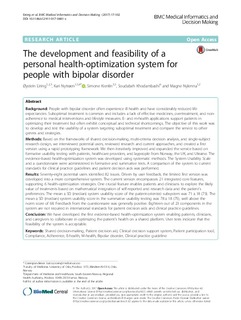| dc.contributor.author | Eiring, Øystein | |
| dc.contributor.author | Nytrøen, Kari | |
| dc.contributor.author | Kienlin, Simone Maria | |
| dc.contributor.author | Khodambashi, Soudabeh | |
| dc.contributor.author | Nylenna, Magne | |
| dc.date.accessioned | 2017-08-18T11:02:16Z | |
| dc.date.available | 2017-08-18T11:02:16Z | |
| dc.date.created | 2017-07-15T06:36:01Z | |
| dc.date.issued | 2017 | |
| dc.identifier.citation | BMC Medical Informatics and Decision Making. 2017, 17 . | nb_NO |
| dc.identifier.issn | 1472-6947 | |
| dc.identifier.uri | http://hdl.handle.net/11250/2451146 | |
| dc.description.abstract | Background
People with bipolar disorder often experience ill health and have considerably reduced life expectancies. Suboptimal treatment is common and includes a lack of effective medicines, overtreatment, and non-adherence to medical interventions and lifestyle measures. E- and m-health applications support patients in optimizing their treatment but often exhibit conceptual and technical shortcomings. The objective of this work was to develop and test the usability of a system targeting suboptimal treatment and compare the service to other genres and strategies.
Methods
Based on the frameworks of shared decision-making, multi-criteria decision analysis, and single-subject research design, we interviewed potential users, reviewed research and current approaches, and created a first version using a rapid prototyping framework. We then iteratively improved and expanded the service based on formative usability testing with patients, healthcare providers, and laypeople from Norway, the UK, and Ukraine. The evidence-based health-optimization system was developed using systematic methods. The System Usability Scale and a questionnaire were administered in formative and summative tests. A comparison of the system to current standards for clinical practice guidelines and patient decision aids was performed.
Results
Seventy-eight potential users identified 82 issues. Driven by user feedback, the limited first version was developed into a more comprehensive system. The current version encompasses 21 integrated core features, supporting 6 health-optimization strategies. One crucial feature enables patients and clinicians to explore the likely value of treatments based on mathematical integration of self-reported and research data and the patient’s preferences. The mean ± SD (median) system usability score of the patient-oriented subsystem was 71 ± 18 (73). The mean ± SD (median) system usability score in the summative usability testing was 78 ± 18 (75), well above the norm score of 68. Feedback from the questionnaire was generally positive. Eighteen out of 23 components in the system are not required in international standards for patient decision aids and clinical practice guidelines. | nb_NO |
| dc.language.iso | eng | nb_NO |
| dc.publisher | BioMed Central | nb_NO |
| dc.relation.uri | https://bmcmedinformdecismak.biomedcentral.com/track/pdf/10.1186/s12911-017-0481-x?site=bmcmedinformdecismak.biomedcentral.com | |
| dc.rights | Navngivelse 4.0 Internasjonal | * |
| dc.rights.uri | http://creativecommons.org/licenses/by/4.0/deed.no | * |
| dc.title | The development and feasibility of a personal health-optimization system for people with bipolar disorder | nb_NO |
| dc.type | Journal article | nb_NO |
| dc.type | Peer reviewed | nb_NO |
| dc.description.version | publishedVersion | nb_NO |
| dc.source.pagenumber | 11 | nb_NO |
| dc.source.volume | 17 | nb_NO |
| dc.source.journal | BMC Medical Informatics and Decision Making | nb_NO |
| dc.identifier.doi | 10.1186/s12911-017-0481-x | |
| dc.identifier.cristin | 1482305 | |
| dc.description.localcode | © The Author(s). 2017. This article is distributed under the terms of the Creative Commons Attribution 4.0 International License (http://creativecommons.org/licenses/by/4.0/), which permits unrestricted use, distribution, and reproduction in any medium, provided you give appropriate credit to the original author(s) and the source, provide a link to the Creative Commons license, and indicate if changes were made. The Creative Commons Public Domain Dedication waiver (http://creativecommons.org/publicdomain/zero/1.0/) applies to the data made available in this article, unless otherwise stated. | nb_NO |
| cristin.unitcode | 194,63,10,0 | |
| cristin.unitname | Institutt for datateknikk og informasjonsvitenskap | |
| cristin.ispublished | true | |
| cristin.fulltext | original | |
| cristin.qualitycode | 1 | |

